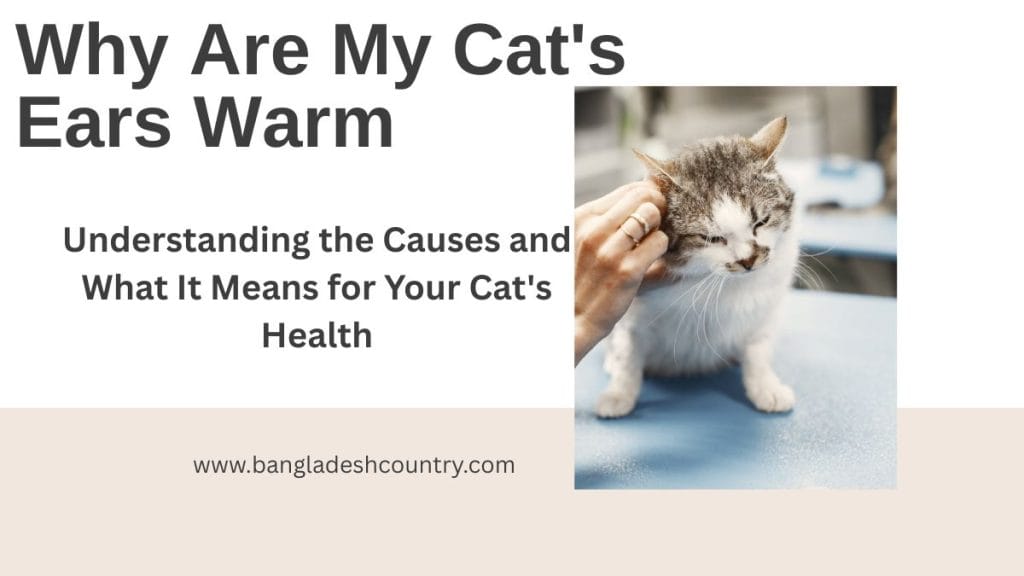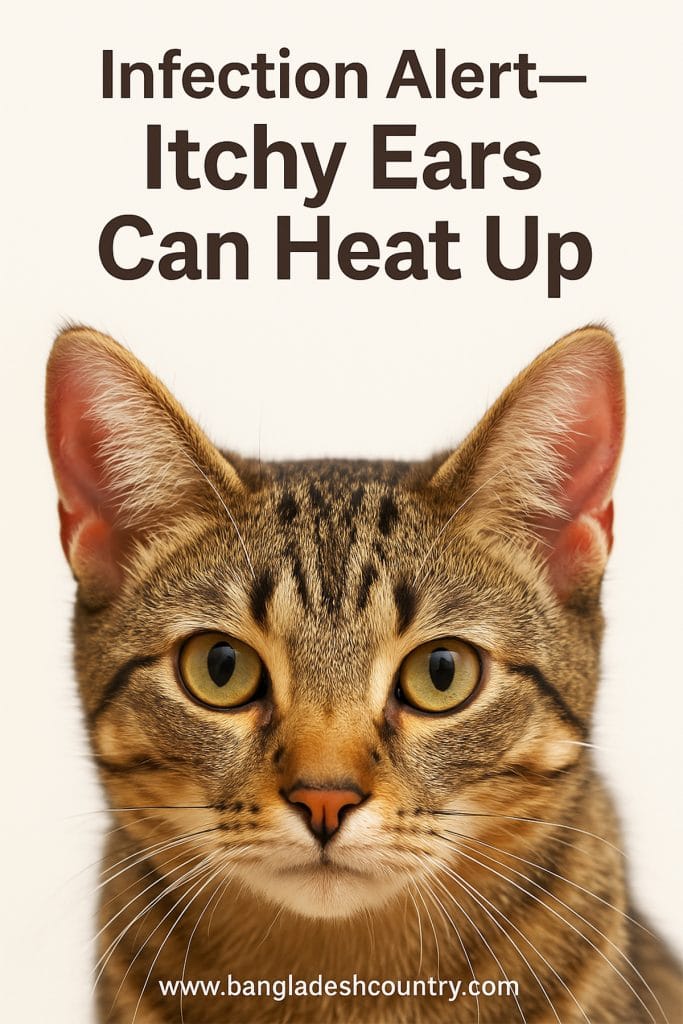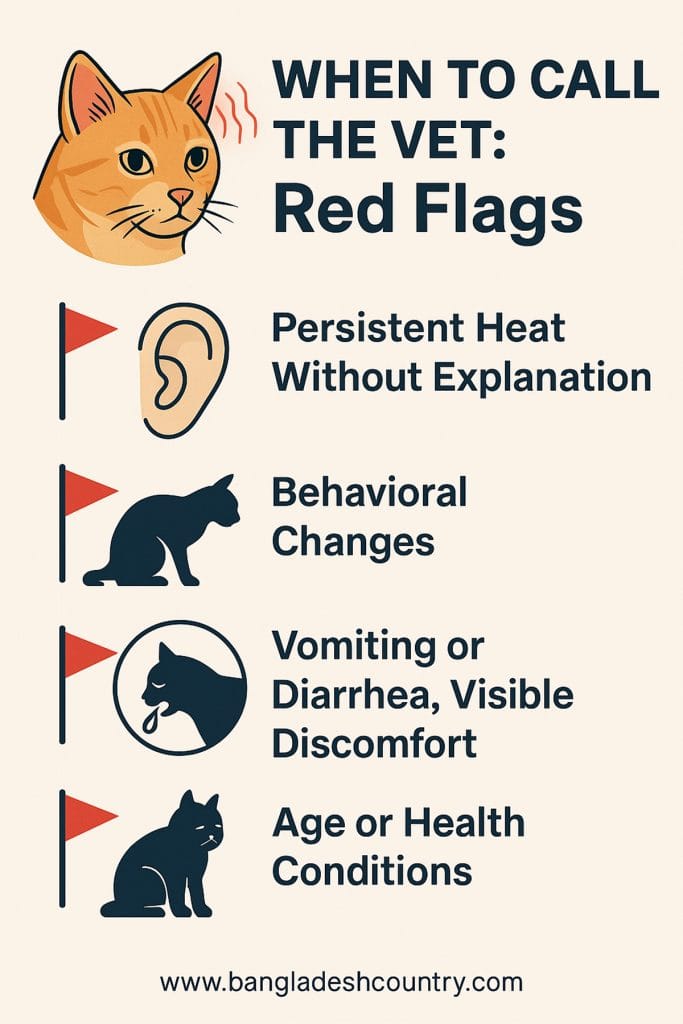Introduction
Why Do Cats Have Warm Ears? Many cat owners wonder why their cat’s ears feel warm. Is it normal or a reason to worry?
A cat’s normal body temperature is slightly higher than a human’s, which means their ears, paws, and nose often feel warm to the touch. Cats also use these areas to help regulate their body heat.
Sometimes, cat hot ears are perfectly normal. Other times, they might signal fever, infection, or overheating. This guide will explain seven reasons why your cat’s ears get warm. You’ll learn what’s safe, when to watch closely, and when it’s time to call your vet. Whether you’re looking for details on how much it costs to cremate a cat or exploring other important aspects of pet care, understanding these common concerns is crucial.

1. It’s Totally Normal (Most of the Time)
It’s common for your cat’s ears to feel warm, especially after napping in a sunny spot or curling up somewhere cozy. Cats have a higher body temperature than humans, so warm ears are usually normal.
This warmth is part of how your cat regulates their body temperature. When they sleep or relax, blood flows more to their ears, paws, and nose, making these areas feel warmer.
Cat hot ears after resting or playing are usually nothing to worry about. It’s just a sign that your cat is comfortable and healthy.
2. Environmental Heat – Sunbeams and Radiators
Cats love warm spots like sunny windowsills, soft blankets, or near radiators. When they spend time in these places, their ears often feel warmer.
This happens because their ears, paws, and nose help release excess heat more easily. Cat hot ears in these situations are normal and show their body is adjusting to the environment. Extreme heat can cause discomfort, so make sure your cat has access to cool places and fresh water to avoid overheating, especially in summer.
3. Post-Nap Warmth or Playtime Glow
Your cat’s ears may feel warmer after a nap or a burst of play, and that’s usually normal. When they sleep, blood pools in their ears, paws, and nose, warming these spots when they wake up.
Playtime also raises their body temperature. As they cool down, heat escapes through thin areas like their ears. Cat hot ears after play is common and nothing to worry about.
However, if warm ears come with other signs like bloating, diarrhea, sneezing, or excessive licking, it could suggest a health issue. Always watch for multiple symptoms and talk to your vet if you’re concerned.
4. When Warm Ears Can Signal Illness
Warm ears are often normal, but sometimes they can mean your cat is sick. Cats have a normal body temperature that’s slightly higher than a human’s, but if it gets too high, it can mean fever.
Cat hot ears that stay warm without sun or play could be a warning sign. Watch for other symptoms like low energy, hiding, or refusing food.
If your cat is also showing signs like bloating, diarrhea, sneezing, wheezing, watery eyes, or excessive licking, it could indicate a more serious issue, such as an infection or allergies. Your cat may show signs like bloating diarrhea sneezing wheezing watery eyes excessive licking and you guessed it might be allergies.
If you suspect a fever, test your cat’s temperature with a pet thermometer. Over 103°F means you should call your vet. Don’t wait—vet anyway if your cat seems very ill. Early treatment helps prevent complications.
If you’re concerned about your cat’s health and what could happen posthumously, it’s important to understand options like cremation. For more on this, you can read about how much it costs to cremate a cat.
5. Infection Alert — Itchy Ears Can Heat Up

Cat hot ears plus scratching or head shaking can mean an ear infection. Cat ear infections include bacteria, yeast, or even mites causing inflammation. Some cats develop issues like ears food allergies environmental which can lead to constant itching and irritation.
If your cat’s ears are warm and itchy, it could also point to environmental factors or food allergies that affect their ears. Be aware of these signs:
- Head shaking or tilting
- Redness, swelling, or dirty discharge
- Bad smell from the ears
- Excessive scratching or rubbing on furniture
Ear infections include dirty buildup that traps bacteria. It’s important to visit your vet so they can diagnose and treat the infestation properly.
6. Could It Be Heatstroke?
Extremely hot ears plus other symptoms may mean heatstroke, which is an emergency. Cats can’t sweat like humans, so they rely on their ears, paws, and nose to release heat.
Cat hot ears that feel much warmer than usual, along with these signs, are red flags:
- Rapid breathing or panting
- Drooling a lot
- Vomiting or diarrhea
- Weakness or collapsing
- Trembling or glassy eyes
If you see these symptoms, move your cat to a cool, shaded area right away. Offer fresh water and gently wipe them with a damp cloth. Avoid ice-cold water. Call your vet immediately—heatstroke can be life-threatening if untreated.
7. Just the Tips? It Might Be Circulation
If only the tips of your cat’s ears feel warm, it’s usually normal. The ears have many small blood vessels that help manage temperature. When blood flow increases, the tips warm up faster.
Cat hot ears at the tips can happen during excitement, stress, or temperature changes—it’s no coincidence they warm as the temperature rises. This helps your cat stay comfortable.
As long as your cat seems relaxed and shows no other symptoms, this warmth is harmless. But if you notice behavior changes or signs of illness, check with your vet.
When to Call the Vet: Red Flags

Vets often consider ears food allergies environmental factors when diagnosing chronic ear problems in cats. The connection between ears food allergies environmental triggers is something every cat owner should be aware of. If your cat keeps scratching its ears food allergies environmental conditions could be the hidden cause. While cat hot ears are often normal, some signs mean you should call your vet. Look out for these warning signals:
- 1. Persistent Heat: If your cat’s ears stay warm for a long time without clear reasons like resting or sunbathing, it may be a fever or infection.
- 2. Behavior Changes: Watch for hiding, being unusually clingy, growling, or low energy. These changes, with warm ears, can be clues something is wrong.
- 3. Other Symptoms Appear: Be alert for vomiting, diarrhea, rapid breathing, trembling, or symptoms of allergies like sneezing and watery eyes. These can point to infection, fever, or heatstroke.
- 4. Age or Health Issues: Kittens, senior cats, or those with health conditions are more at risk. Even mild warmth in their ears may need attention, so always monitor them closely.
How to Keep Your Cat’s Ears Healthy
Now that you understand the potential reasons why your cat’s ears might feel warm, it’s time to focus on maintaining their overall ear health. Taking a few proactive steps can help ensure that your cat’s ears stay healthy and reduce the risk of infections or other complications. While keeping your cat’s ears healthy is crucial, it’s also important to think about future decisions, such as how you might handle their remains. Learn more about cat cremation costs to be better prepared. The connection between ears food allergies environmental triggers is something every cat owner should be aware of.
Understanding why your cat’s ears get warm is important. Here’s how to keep them healthy and avoid problems:
- 1. Keep Their Environment Comfortable: While some warmth is natural, too much heat can cause overheating. Make sure your cat has cool spots to relax in, especially during warmer months. Use fans or air conditioning if needed.
- 2. Hydration Is Key: Hydration helps your cat regulate their body temperature. Always provide fresh water, especially in hot weather. Cats sometimes prefer running water, so consider a water fountain if your cat ignores traditional bowls.
- 3. Regular Cleaning (Gently): Regular ear cleaning prevents infections. Use a vet-approved cleaner and wipe gently. Avoid inserting anything deep into their ears. If you notice discharge, redness, or your cat flinches, talk to your vet.
- 4. Brushing Them Daily: Brushing your cat daily can help remove dirt and debris that could cause infections. Regular grooming is part of overall ear health.
- 5. Regular Vet Checkups: Annual or bi-annual vet visits are crucial for monitoring your cat’s health. Mention any concerns about their ears or behavior during your visit. Early detection is the key to keeping your cat healthy.
8: Conclusion: Know the Signs Behind Warm Cat Ears
Now you understand why your cat’s ears may feel warm. It could be due to normal body regulation, environmental heat, or even an illness.
A little warmth is usually nothing to worry about. But if your cat’s ears stay hot and are accompanied by other symptoms, it could signal a health issue.
Remember, your cat’s normal body temperature is slightly higher than a human’s, and their ears, paws, and nose help regulate their body. If you see warm ears with behavior changes, low energy, or signs of fever, don’t wait—consult your vet. Staying proactive with your cat’s health will help keep them happy and comfortable for years.
9: FAQ About Cat’s Ears Warm
Are warm ears normal in cats?
Yes! Cats’ ears can naturally feel warm due to their body temperature and blood flow. It’s normal unless accompanied by other signs of illness.
Why are just the tips of my cat’s ears warm?
The tips of your cat’s ears have many blood vessels that help regulate body temperature. When blood flow increases, they can warm up more quickly. It’s normal if there are no other signs of discomfort.
Could warm ears mean my cat has a fever?
Yes, warm ears combined with symptoms like lethargy, loss of appetite, or hiding could mean a fever. It’s best to check your cat’s temperature and consult your vet if it’s over 103°F.
Can ear infections make my cat’s ears warm?
Yes. Infections cause inflammation, making ears feel warm. If your cat is scratching their ears, shaking their head, or has discharge, it may be an infection that needs veterinary treatment.
Do cats get warm ears after playing or sleeping?
Yes, it’s common for your cat’s ears to warm up after a nap or play session. Increased blood flow during relaxation or activity can cause temporary warmth, which is usually harmless.
Is it dangerous if my cat’s ears are hot and they’re panting?
Yes! Hot ears combined with panting, drooling, or weakness could mean heatstroke, which is an emergency. Move your cat to a cool area and contact your vet immediately.
What else could cause my cat’s ears to heat up?
Warm rooms, sun exposure, or heated blankets can cause your cat’s ears to warm up. It’s usually fine unless your cat shows signs of discomfort.
Should I check my cat’s ears regularly?
Yes. Weekly checks for redness, discharge, or swelling can help detect infections early. Keeping their ears clean can prevent issues.
How can I keep my cat’s ears healthy?
Keep your cat hydrated, maintain a comfortable temperature, and clean their ears gently with vet-approved products. Regular vet visits also help monitor their health.
When should I worry about warm ears in cats?
If your cat’s ears stay warm for extended periods, show behavioral changes, or have other symptoms like vomiting, lethargy, or excessive licking, it’s time to consult a vet.



